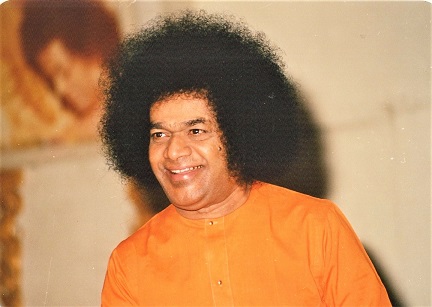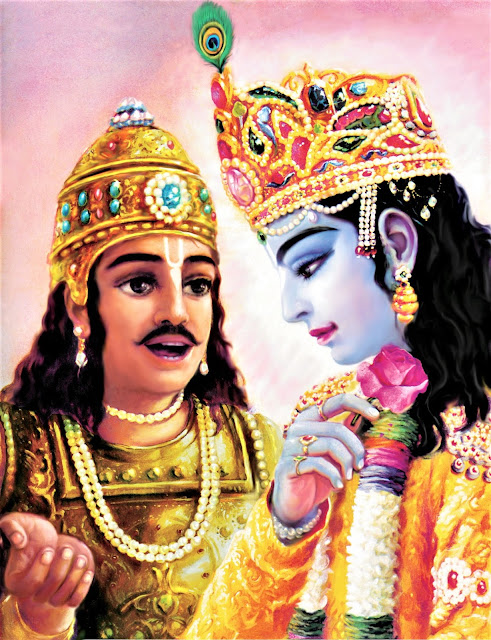 |
| Sri Sathya Sai in the Brindavan Campus Hostel |
Sneha is the eighth of nine stages of Bhakti (devotion) described in the Bhagavata and other texts. It is usually translated as 'friendship', a term that has been understandably vulgarized by application to certain transitory relationships between living beings. Friends come together as a result of a variety of reasons and circumstances which are mostly of worldly and temporary interest. People who have ample resources gain friends quickly, as do also those who have a great deal of patronage in their hands or can distribute favours. Those in authority also gather friends, who, of course, stay on during fair weather but disappear when the authority fades. Most friendships are based on selfish considerations and last only as long as selfish interests are promoted thereby. As the proverb goes, When the lake is full there are also frogs in plenty, but when it runs dry not a single croak is heard."
Friendship ought to be a spiritual bond, a heart to heart kinship based on full understanding of and pure dedication of one to another. Students should be vigilant against false and fleeting friendships and not be simply led away by hellos and handshakes. Do not cultivate close friendship with anybody unless you know that the motives on the other side are pure, unselfish and spiritual.
Unique friendship between Krishna and Arjuna
Genuine friendship can only be possible between one Atma and another, that is to say, between two persons who have each realized that Atma is the core of their being. Nowhere on the mundane plane can you get the genuine Sneha which is declared as the penultimate stage to Sharanagati or Atma Nivedana (total surrender and dedication to God), among the trivial, transitory friendships of worldlings.

Arjuna and Krishna had this genuine Sneha between them. Arjuna saw Krishna as his Sakha (friend), and therefore had the temerity to use words of jesting irreverence during 'play, or while in repose, or when seated by him, or at meals' (Vihaara Shayyaasana Bhojaneshu). The two often ate meals from the same plate, and were ready to help each other under all circumstances. Do not be under the impression that Arjuna was insidiously overpowered by Krishna. He was mature in character, well-versed in the Vedic lore and a redoubtable warrior and bowman full of courage and heroism. Krishna was the Purushottama (Supreme Being), Arjuna the Narottama (best human). It was a friendship between the Embodiment of the Highest and the embodiment of the best. Krishna was the Avataric (incarnated) Person; Arjuna was the Anandic (blissful) person; it was a coming together of the Avatara Murti and the Ananda Murti. Arjuna was often addressed by Krishna as Kuru Nandana. This name has a deep significance. Kuru means ‘act, activity, karma’. Nandana means ‘happy, delighted’. Kuru Nandana, therefore, means he who is delighted while engaged in activity. Throughout the eighteen chapters of the Geetha, Arjuna is alert and active, participating vigilantly in every turn of argument.
Krishna's assurance to all who offer their self
Ramakrishna Paramahamsa was fascinated by the Sneha that was exemplified by the Krishna- Arjuna relationship. He learned from the Bhagavata and the Bhagavad Geeta how the Sadhaka (spiritual aspirant) can go through all the nine stages of Bhakti (devotion). He was also determined to emulate the Gopis (cowherd girls) and earn for himself the Viraha (passionate) type of Bhakti, Madhura Bhakti (sweet devotion), that the Gopis had. When he read the Ramayana, he decided to emulate Hanuman and practise his Dasa Bhakti (devotion of servitude). Of all the Shlokas (verses) in the Bhagavad Geeta, Ramakrishna was especially impressed by the one that emphasised the attitude of Atma Nivedana or Sharanagati.
One day, while Ramakrishna was going to Kamarpukur, night overtook him and he was caught in heavy rain right in the centre of a burial ground. Of course he was in such an ecstatic mood that the time, place or weather mattered little to him. When he awoke, Ramakrishna called upon God by various names - Rama, Shiva, Krishna, Kaali, Hanuman. Then he suddenly realised that the names all referred to the One, and he repeated within himself the verse from the Geetha that reminded him of Sharanagati (absolute surrender) to the One.
Surrender absolutely to God to get peace
Many interesting incidents took place at Dakshineshwar. When Ramakrishna was once asked to go to the temple office to receive his monthly salary, he was very much upset, for he never wanted any wages for being given the chance of worshipping His Mother. At another time, thieves broke into the Krishna temple. When Ramakrishna and Mathuranath came by there and discovered that Krishna's idol was absolutely bare and that every jewel had been stolen, Mathuranath fell into a rage and began blaming Krishna Himself. "You are adored as the Guardian of the 'fourteen worlds,' but you cannot guard even the jewels on your own body," he said. Ramakrishna reprimanded him soundly for this sacrilege, saying, "Krishna has Lakshmi as His Consort, and for Him your gold and gems are as cheap as dust. As a matter of fact, what is gold but dust in another form?" He made Mathuranath repent for his silly outburst, making him aware of the true nature of God-head.
If only you surrender your wish and will, your fancies and fantasies to God, He will lead you aright and give you peace and joy. You must not run after diverse ends and flitting pleasures. Leave everything to God; accept whatever happens, as His Will. Ambareesha was a King who stuck to all the Vedic injunctions and observed all the rites and rituals laid down in these texts. He was noble, sincere and very devoted to Vishnu, the Form that embodies the fostering and sustaining aspect of God.
True devotion of King Ambareesha
Fasting on Ekadashi day and breaking the fast as-soon as Dwaadashi came in, was one of the important rites that Ambareesha observed meticulously every fortnight. Ekadashi is the eleventh day of the Moon and Dwaadashi, the twelfth day. The fast has to be broken with prayers to Vishnu and the partaking of the offering made to Him as soon as, according to the lunar calendar, the twelfth lunar day has started. On one occasion, a few hours before the approach of Dwaadashi, the great sage Durvasa, reputed for his frequent fits of fury and burst of uncontrollable temper, arrived at the palace of Ambareesha. He was heartily welcomed by the King. Ambareesha pleaded with him to proceed to the Ganges, finish his ablutions and return in time for the breaking of the Ekadashi fast. But the sage took his own time and was nowhere evident when the crucial moment arrived.
Ambareesha was in a fix. He consulted his preceptor who advised him to sip a few drops of sanctified water, since that could be considered breaking of the fast. On Ekadashi day, even water is taboo during the period of fasting. He said that Durvasa had no reason to get angry, since the drops of water were taken by him only as a token to keep the vow. But when the sage came and learnt about it all, he became so wild that he cursed Ambareesha for having broken the fast in his absence and started the meal. As the curse took form, the Chakra (discus) of Vishnu appeared on the scene and confronted Durvasa.
A devotee takes the curse as a gift from God
Ambareesha took the curse as a gift from God; he submitted himself to it in the spirit of a Sharanagati, for he had no will of his own. Thus, God came to his rescue. Ambareesha did not call upon Vishnu and pray that he may be saved from. the anger of Durvasa. He accepted that too as the Will of Vishnu. The Chakra pursued the terrified sage over all the three worlds, and when Durvasa fell at the feet of Vishnu, He directed him to approach Ambareesha himself to pardon. The attitude of surrender or Atma Nivedana (offering the self to God) makes a person dedicate his entire personality at the Feet of the Lord.
In the Ramayana, too, we have an episode that illustrates this. Rama and Lakshmana were combing the forests to discover where Seeta was. They were tired and thirsty. Suddenly, they came upon a clear pool and, while placing their bows on the ground, dropped their arrows which partially sank into the wet bank. After slaking their thirst, they put the bows on their shoulders and pulled the arrows out from the bank. Rama noticed a stain of blood at the tip of his arrow and was curious to find out how it came there. Lakshmana discovered a little frog that had been hit by Rama's arrow when he dropped it on the ground.
Rama told the wounded frog, "Poor thing! Why did you not cry out when you were hit?" The frog replied, "Whenever in trouble, I cry out to you Rama. But, when Rama Himself inflicts pain, whom am I to cry out to? I accepted it as His Grace." Bheeshma adored Krishna even when He was rushing towards him with His Chakra to take his life. His sense of Sharanagati (total surrender to Divinity) did not desert him at the point of death at the hands of the very Person whom he revered as God: "Kill me or save me, I shall not falter in my loyalty," he said.
See God in every being, Sneha will blossom
Ramakrishna had the same sense of total dedication. He was in great pain as the result of a cancer, and his disciples asked him to pray to the Mother for alleviation of the pain. Vivekananda was desperate when his master refused to ask this little favour from the Mother with whom he was literally on speaking terms. But Ramakrishna replied that if it was the Mother's Will that he must suffer, he was not going to pray for palliatives. But his disciples were adamant. They bothered Ramakrishna so much that one day he prayed to the Mother that he may be helped to take a little food in spite of the cancer in his throat. Ramakrishna told his disciples that at that time he heard the Mother admonishing him for his ignorance: “Are you not eating through all these billion throats? Why regret that one throat is incapable of taking down food?" (Vaasudevassarvaamidam). This truth was brought home to the disciples by this revelation.
The Sneha (friendship) stage of Arjuna is the stage when all distinctions between the devotee and God disappear and the two friends are One. When this stage of utter trust, unshakeable faith, and complete absence of doubt, fear and anxiety is reached, the next stage of Atma Nivedan is natural and easy to cover. This is real friendship to which the youth must aspire. See God in every being and then true Sneha will blossom, This type of true Sneha can come only when you follow the advice of Krishna. ‘He who has no trace of hatred towards any creature, who is friendly and compassionate towards all, who is free from the bondage of 'I' and 'mine,' who takes pain and pleasure as equally welcome and who is forbearing in spite of provocation...’
Develop these qualities in you, for they are the signs of true Sneha, for it is only when you are proceeding on the Godward journey along the nine stages of Bhakti (devotion) that you can attain this Divine ideal of true friendship.
Source: Divine Discourse on August 20, 1978 at the Sri Sathya Sai Hostel, Brindavan
Саи Рам
Комментариев нет:
Отправить комментарий